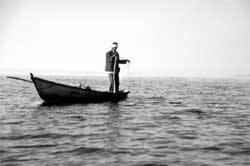Trouble at sea
 On july 11, 2001, fisherfolk across the country were thrown in at the deep end when the Union ministry of environment and forests (mef) announced a blanket ban on the catching, processing, stocking and sale of 60 types of sea creatures. These included the entire sub-class of elasmobranches (sharks, rays and skates), certain varieties of corals and 52 kinds of molluscs.
On july 11, 2001, fisherfolk across the country were thrown in at the deep end when the Union ministry of environment and forests (mef) announced a blanket ban on the catching, processing, stocking and sale of 60 types of sea creatures. These included the entire sub-class of elasmobranches (sharks, rays and skates), certain varieties of corals and 52 kinds of molluscs.
The mef's unilateral decision sparked nationwide protests by fishworkers who faced the threat of going under. As the agitation intensified and assumed political overtones, the government was forced to review the regulations. Last heard, a watered down version was in the pipeline.
What prompted the authorities to slap this sweeping ban? And why the haste? S C Sharma, additional director general of forests, mef, says the drastic step was required to protect sharks and other endangered marine life. "After the notification was issued, we had consultations with scientific institutions and fisherfolk. We saw no need to do this earlier,' reveals Sharma, betraying the authorities' characteristic insouciance.
Bolt from the blue In May 2001, the whale shark (Rhincodon typus) was brought under schedule one of the Wildlife Protection Act (wpa) of 1972. Schedule one comprises the most endangered animals, which are provided maximum protection. Conservationists all over the world hailed this much-publicised move of the mef to save the commonly slaughtered whale shark (see
Related Content
- Report by the District Mineral Officer, Baramulla on gypsum mining affecting the health of villagers, 11/09/2023
- Order of the National Green Tribunal regarding illegal disposal of bio medical waste in village Mohanpur, district Ashoknagar, Madhya Pradesh, 08/02/2023
- Panipat Thermal Power Station dumping fly ash illegally: NGT directs the committee to look into the matter
- Africa in the new trade environment: market access in troubled times
- Cost of a plate of food 2020
- Violence without Borders: The Internationalization of Crime and Conflict
